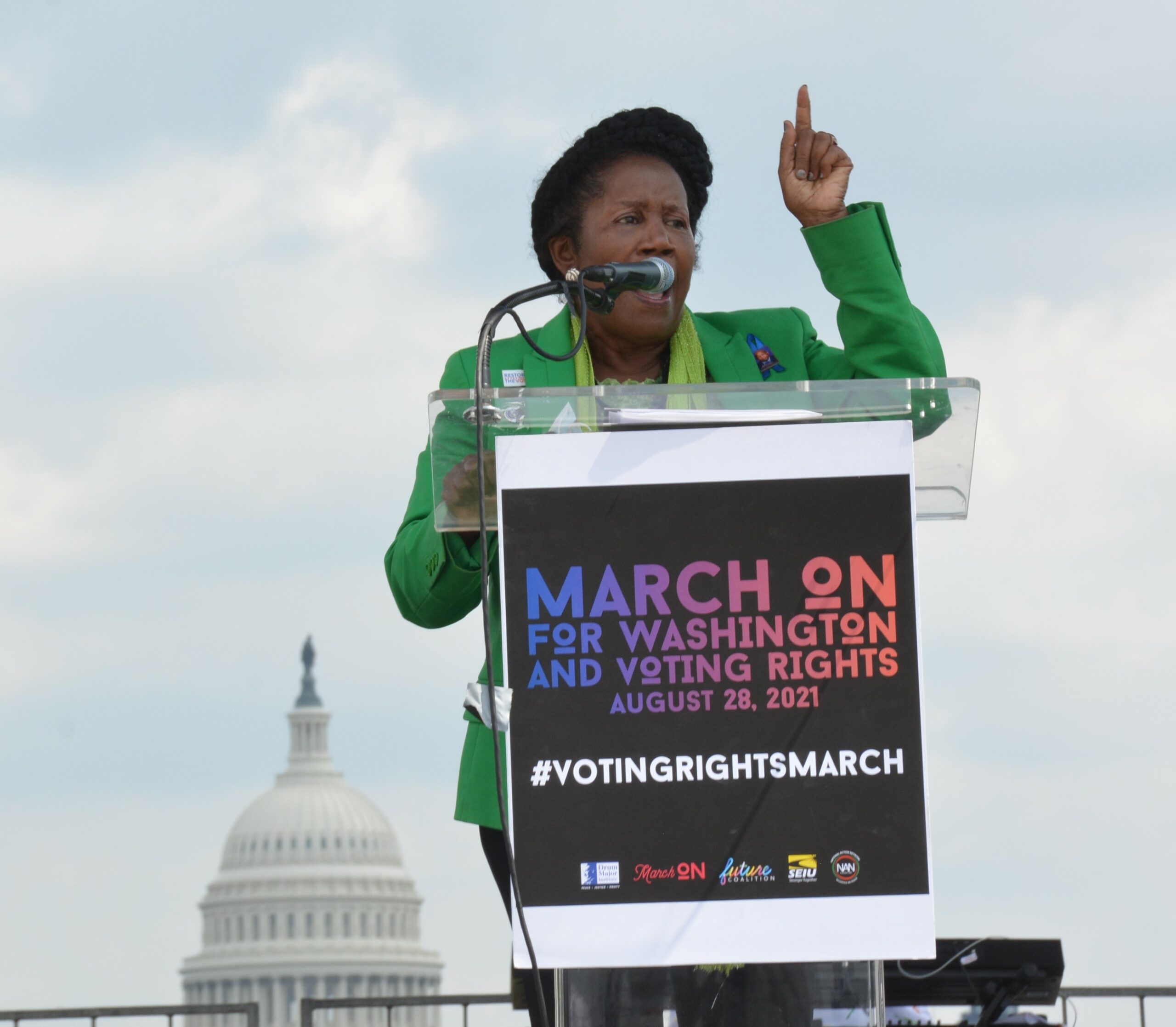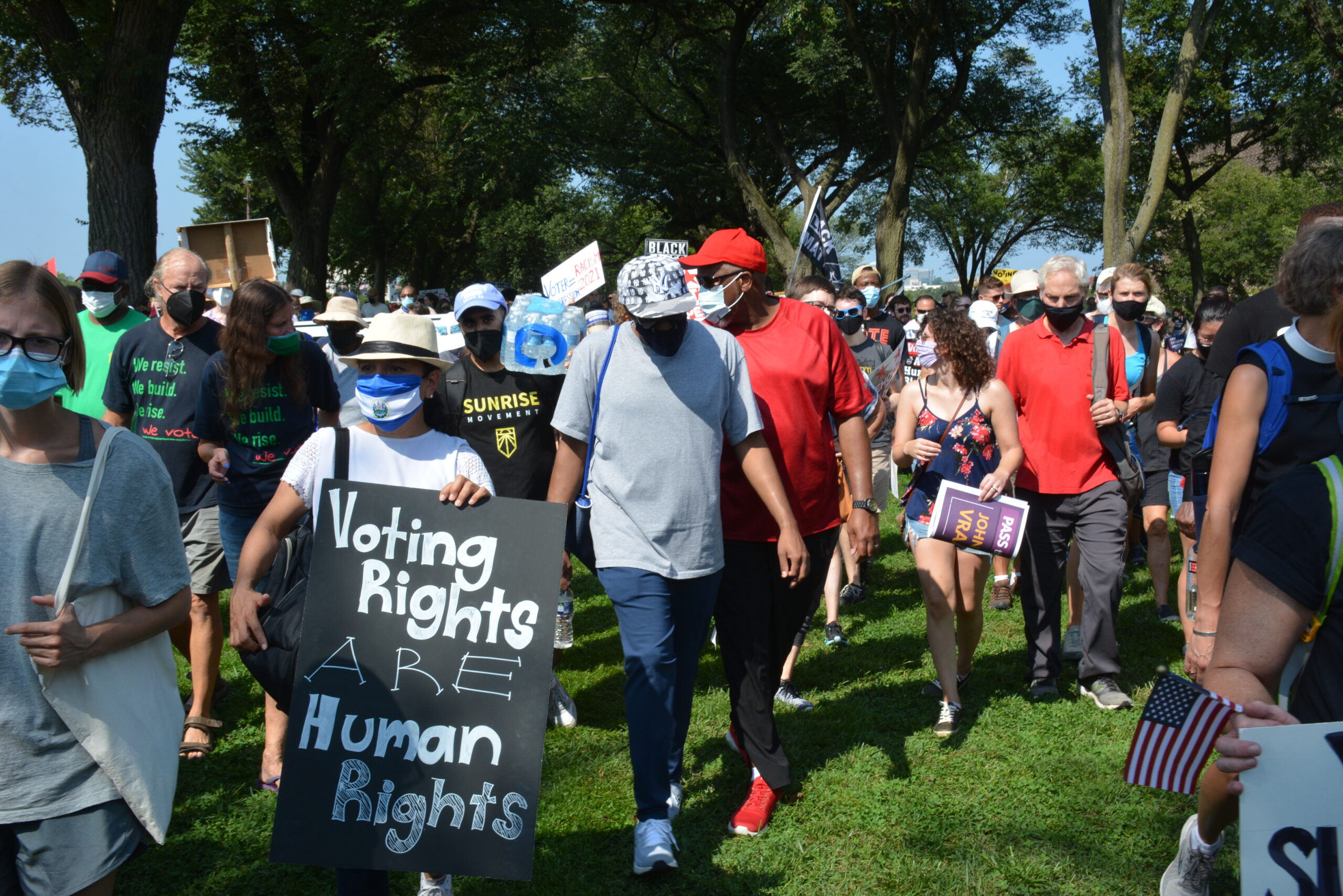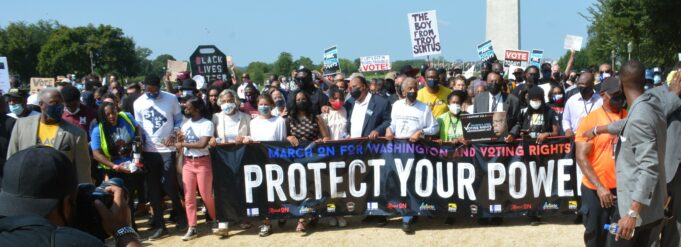WASHINGTON—For 58 years, Blacks and social justice advocates have commemorated the 1963 “March on Washington for Jobs and Justice” where Dr. Martin Luther King delivered his “I Have A Dream” speech. An estimated 20,000 people returned this year to the National Mall for the “March On For Voting Rights.”
One of the goals of organizers is to get a federal law passed that would restore key protections of the Voting Rights Act of 1965, which outlawed discriminatory voting practices. The bill, the John Lewis Voting Rights Advancement Act, is named after the late civil rights activist and longtime Congressman John Lewis.
It was approved in the U.S. House of Representatives in August but faces stiff opposition in the Senate. The bill passed along party lines, but Democrats do not have the votes to overcome defiant opposition from Republicans.
Congressman Lewis’ youngest brother Grant Lewis spoke at the march and told Republican senators they needed to dismiss partisanship and pass the law.
“Just think, 58 years later we are still fighting for those same rights. Something about that just don‘t sound right,” Mr. Lewis told the crowd. “It doesn’t matter what side of the aisle you are on. It’s more important to be on the right side of history,” he said.
“Fifty-eight years ago, my brother and others spoke at this event for voter rights. We now realize more than ever this fight is not for a day, or a week, or a month or even a year. We must be committed to fight for a lifetime.”

The Aug. 28 gathering was organized by the Rev. Al Sharpton’s National Action Network, the Drum Major Institute, March On, Future Coalition, SEIU, 51 for 51, and over 140 other partners. It was organized as a mass mobilization to demand that elected officials protect democracy, denounce voter suppression, make D.C. a state, and ensure fair, easy access to the vote.
Organizers of the march were concerned they are witnessing the return of the Jim Crow era with new state-level legislations that restrict access to voting and the weakening of the Voting Rights Act.
With new voting laws in states like Arizona, Arkansas, Florida, Georgia, Iowa, Kansas, Montana and Wyoming, the Voting Rights Lab has determined each state law is different, however each has the effect of restricting voter access. Texas is next to pass its own set of restrictions.
“I remember hearing stories from my grandfather of how hard it used to be when they tried to vote in Georgia before they moved up North,” Lonnie Morgan from D.C. told The Final Call. “Those stories used to make me feel so sad because it is so easy for me to vote, I just take it for granted. I’m here today at this march because once upon a time it wasn’t so easy for Black people to vote,” she said.
“Many young people cannot imagine not being able to go to the polls and vote. They just can’t get their brains to think like that, but it could happen again. We keep doing the same things to prevent it from happening with the hopes that it will be enough. I pray it will be enough.”

While activists point the finger at Republicans, moderate-Democrats in the Senate are also lukewarm when it comes to preserving voting rights. Senators Joe Manchin of West Virginia and Kyrsten Sinema of Arizona both oppose eliminating the legislative filibuster so the bill—if it even makes it for a vote—would need 60 votes in order to end unlimited debate in the Senate for a final vote. That is unlikely to happen. Senator Lisa Murkowski of Alaska is the sole Republican that has said she supports the John Lewis Voting Act.
In addition to the event in D.C., rallies also took place in Atlanta, Miami and Phoenix and dozens of other cities with speakers such as Rev. Dr. Terry E. Mackey from the Pilgrim Rest Baptist Church in Phoenix.
“Something is wrong in our state whenever we have discriminatory practices when it comes to everyone in this room, everyone in this state,” Dr. Mackey told the live stream audience. “It’s time for us to get into what John Lewis called ‘Some good trouble’.”
In D.C., participants gathered early Saturday and marched to the National Mall for a rally with the U.S. Capitol as a backdrop. Speakers included Washington, D.C. Mayor Muriel Bowser; Alicia Garza, a co-founder of the Black Lives Matter movement; Martin Luther King III, his wife Arndrea Waters King, and their daughter Yolanda Rene King.
Rev. Sharpton explained that the group decided not to go to the Lincoln Memorial this year because they wanted to focus on the Capitol. That’s where “Senators will decide whether to continue the segregationist legislative strategy of filibuster or whether they’re going to give the people of this country the right to vote with no prohibition,” he said.
“That building is the target of our social justice movement. Not 58 years ago, but today,” Rev. Sharpton said.
Student Minister Ava Muhammad, National Spokesperson for the Honorable Minister Louis Farrakhan and the Nation of Islam is concerned about the continued methodology of marching to ask for rights from an enemy that has shown time and time again, it will not change for the interests of Black and oppressed people.
“Fifty-eight years is more than two generations. The fact that we continue to battle over and over again for the same basic human rights confirms what the Honorable Elijah Muhammad warned us about. There is no getting along with White America for the former slave. The essential relationship of slave master and slave has never changed,” said the attorney and author.
“With modern technology, certain advancements in certain areas have actually covered the reality of the slave master, slave relationship. This is why there is still massive resistance by a corporate-controlled United States government for Black, Brown and indigenous people to play a meaningful role in American politics,” added Student Min. Ava Muhammad.
She explained that Black people must see the need to do for self by exercising economic independence, spending in their own communities, and focusing on economic and financial unity. That she believes would lead to meaningful political activism. The Honorable Minister Louis Farrakhan has explained that while politics has a place, “politics without economics is symbol without substance.”
“While we appreciate the activism and the effort of our people,” explained Student Min. Ava Muhammad, “this is becoming an exercise in futility.”
“The worst thing about it is, it turns our youth against us. There are some young people who do participate in these marches however the overwhelming majority of our youth are frustrated by our inability to significantly advance.”













